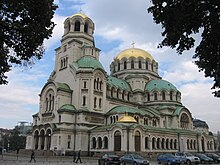
Back الدين في بلغاريا Arabic Θρησκεία στη Βουλγαρία Greek Religion en Bulgarie French Religija u Bugarskoj Croatian Կրոնը Բուլղարիայում Armenian Religioni in Bulgaria Italian Религија во Бугарија Macedonian Religia w Bułgarii Polish Religia în Bulgaria Romanian Религия в Болгарии Russian
Religion in Bulgaria (2021 census)[1]

Religion in Bulgaria has been dominated by Christianity since its adoption as the state religion in 864. The dominant form of the religion is Eastern Orthodox Christianity within the fold of the Bulgarian Orthodox Church. During the Ottoman rule of the Balkans, Islam spread to the territories of Bulgaria, and it remains a significant minority today. The Catholic Church has roots in the country since the Middle Ages, and Protestantism arrived in the 19th century; both of them remain very small minorities. Today, a significant part of the Bulgarians are not religious, or believers who do not identify with any specific religion, and Bulgaria has been the cradle of some new religions, notably the Neo-Theosophical movement of Dunovism.
Since the early 21st century, there has been a decline of both historic religions of Bulgaria—Eastern Orthodox Christianity and Islam. Orthodox Christianity has shrunk from 7.3m or 87% of the population in the 1992 census to 4.4m or 60% in 2011 and 4.1m or 63% in 2021, and Islam from 1.1m or 13% in 1992 to 0.6m or 10% in 2021.[1] Over the same timespan, Protestantism and other non-Eastern Orthodox and non-Catholic Christianities have grown from about twenty thousand or 0.3% of the population in 1992 to about eighty thousand or 1.3% in 2021, while unaffiliated people, comprising both not religious people and people who have some belief but not identifiable with any specific religion, have grown from 0.3m or 4% in 2001 to 1m or 16% in 2021.[1] Until the 1992 census, Bulgarians were obliged to declare the historic religious belonging of their parents and/or ancestors, while since 2001 people were allowed to declare personal affiliation or unaffiliation to any religion.[2] Moreover, beginning with the 2011 census, Bulgarians were allowed to avoid giving any answer to the question about religion; 22% of the population in 2011 and 9.5% in 2021 did not answer.[1]
After the end of the socialist and one-party People's Republic of Bulgaria (1946–1990) and the transition of the country to a parliamentary republic, the revival of Islam was stronger than that of Eastern Orthodox Christianity,[3] and the Bulgarian Orthodox Church has witnessed a serious decline in its membership from 2001 onwards.[2] The authority of the Bulgarian Orthodox Church was undermined since the 1990s because of its collaboration with the erstwhile socialist regime,[4] which was fully revealed with the opening of the state's secret archives in 2012, according to which eighty percent of the clergy were former members of the secret police.[5] Articles 13 of the Constitution of Bulgaria designates Eastern Orthodox Christianity as the traditional religion of the country, but guarantees the free exercise of any religion, that religion is separate from the state, and that it shall not be used for political aims; Article 37 affirms that the freedom of choice of different religious or irreligious views is inviolable, and the state shall safeguard the harmony between them.[6] Unlike former Yugoslavia in the 1990s, Bulgaria has not experienced any significant ethnic or religious strife, and the religious communities of the country coexist peacefully. In fact, the capital Sofia is known for its so-called "Square of Religious Tolerance", where the Church of Saint Nedelya, the Cathedral of Saint Joseph, the Banya Bashi Mosque and the Sofia Synagogue are located within close proximity from each other in the very centre of the city.
- ^ a b c d Cite error: The named reference
Censuswas invoked but never defined (see the help page). - ^ a b Seligman 2014, p. 83.
- ^ Genov & Kalkandjieva 2007, p. 271; Seligman 2014, p. 83.
- ^ Genov & Kalkandjieva 2007, p. 268; Ghodsee 2009, p. 93.
- ^ Djankov 2014, p. 145.
- ^ "Constitution of Bulgaria". National Assembly of the Republic of Bulgaria. Archived from the original on 16 November 2022.
© MMXXIII Rich X Search. We shall prevail. All rights reserved. Rich X Search